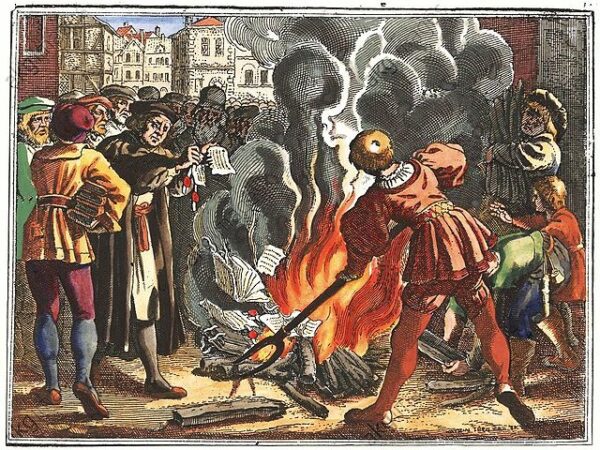On January 3, 1521, Pope Leo X issued the papal bull Decet Romanum Pontificem, a move that reshaped Christianity in Europe and excommunicated Martin Luther from the Catholic Church.
Born in 1483 in Eisleben, Germany, Luther’s journey toward excommunication began in earnest in 1517 when he famously nailed his “95 Theses” to the door of the Castle Church in Wittenberg. These theses were a direct challenge to the Catholic Church’s teaching on several issues, including indulgences, which Luther viewed as a corrupt practice that misled the faithful by suggesting that salvation could be bought with money.
Luther’s actions and writings quickly drew the ire of Church officials. His refusal to recant his teachings led to his appearance before the Diet of Worms in 1521, an imperial council presided over by Emperor Charles V. Despite being given the opportunity to recant, Luther stood firm, famously stating, “Here I stand, I can do no other.” His unwavering stance at the Diet of Worms was a pivotal moment in the Reformation and set the stage for his excommunication. The Church saw Luther’s teachings as a direct challenge to papal authority and the established order, and his actions were deemed heretical.
Pope Leo X issued the papal bull Exsurge Domine in 1520, which condemned Luther’s writings and threatened him with excommunication unless he recanted within 60 days. Luther responded by publicly burning the papal bull and reiterating his opposition to the Church’s doctrines. This act of defiance was a clear and final break with the Church, and it left the papacy with little choice but to respond.
In Decet Romanum Pontificem, Pope Leo X accused Martin Luther of heresy and schism, asserting that Luther’s teachings were dangerous to the unity and authority of the Church. The bull marked a decisive moment in the escalating tensions between the Catholic Church and the emerging Protestant movement. By excommunicating Luther, the papacy aimed to suppress the spread of Protestant ideas and reaffirm the authority of the Pope as the supreme head of the Church.
The issuance of Decet Romanum Pontificem did not, however, quell the flames of the Reformation. Instead, it fueled the flames of religious dissent and intensified the ideological divide between Catholics and Protestants. Rather than turn Luther into an outlaw, he became a hero who was protected by princes in Germany, a leader of the Reformation.






